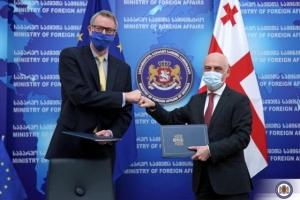EU Commits Further €55 mln for Development of Agriculture & Rural Areas in Georgia
The fourth phase of the EU’s ENPARD program will provide extended assistance in the food safety and SPS sector to enhance consumer protection and promote EU exports of Georgian products. The program will also continue to support rural development to further improve living conditions for a larger proportion of the rural population in Georgia.
The EU Ambassador to Georgia, H.E. Carl Hartzell, and the Acting Minister of Foreign Affairs of Georgia, David Zalkaliani, this week signed an agreement to kick off the fourth phase of the European Neighborhood Program for Agriculture and Rural Development (ENPARD IV) worth €55 million (approximately GEL 215 million). The Acting Minister of Environment Protection and Agriculture of Georgia, Levan Davitashvili, also attended the signature event. The program aims to enhance consumer protection, promote EU exports and improve the livelihoods of the rural population in Georgia. It is part of the wider assistance package mobilized by the EU and Team Europe to support Georgia’s COVID-19 recovery.
"Since 2013, the EU has been providing extensive support to make Georgia’s agriculture more competitive and to improve living standards in rural areas," stated Ambassador Hartzell. "We are happy to announce our continued cooperation with the Government of Georgia under a new, fourth phase of the ENPARD program. Through this program, we hope to see more Georgian farmers, cooperatives, and small and medium-size enterprises better equipped to produce high-quality products and export more to the EU market. We will also support better infrastructure and services, growth of tourism, more effective public-private partnerships and a stimulus to entrepreneurship in rural areas, all with a view to creating new employment opportunities and to boosting economic growth."
“The ENPARD program brings concrete results for our country and particularly for our rural population," Zalkaliani noted. "As a result of this program, the quality of products, the employment opportunities for our citizens and the EU exports are significantly improving. Even more important is the implementation of this program in the pandemic context. The financial support provided to Georgia under the fourth phase of ENPARD is part of the wider EU assistance supporting Georgia’s COVID-19 recovery."
“Georgia is one of the outstanding countries of the Eastern Partnership that has successfully carried out all three phases of the ENPARD program," Davitashvili claimed. "We believe that the fourth phase will be implemented successfully as well. This is a remarkable volume of assistance, €55 million, of which €31 million is going to be direct budget support. However, a very important and efficient part of the assistance is a €24 million technical and grant component, which is going to have a complementary effect on the implementation of our policy also developed in close partnership with the EU."
ENPARD IV will provide extended assistance in the food safety and sanitary and phyto-sanitary (SPS) sector to enhance consumer protection for citizens of Georgia and to promote exports of Georgian products to EU Member States. ENPARD IV will build on the achievements of the Comprehensive Institution Building (CIB) program and of previous ENPARD phases. It will provide further support to the National Food Agency (NFA) for improved inspection and control systems and for the continuation of the legal approximation process including enforcement of newly adopted regulations. It will also support food business operators in their efforts to adapt to the sectoral reforms.
In addition, ENPARD IV will further support rural development and will improve living conditions for a larger proportion of the rural population in Georgia, rendering the rural development sector more dynamic and effectively contributing to Georgia’s economic and social development. The fourth phase of ENPARD will improve the economic and social integration of vulnerable households in disadvantaged rural regions of Georgia, including eco-migrants, conflict-affected people, ethnic minorities, Georgian returnees and migrants. The action will continue to enhance civic participation in the regions of Georgia through increased civil society involvement in local decision-making processes and will continue to actively promote and encourage the participation of youth and women, noting the specific needs and constraints of these groups.
Source: eeas.europa.eu











